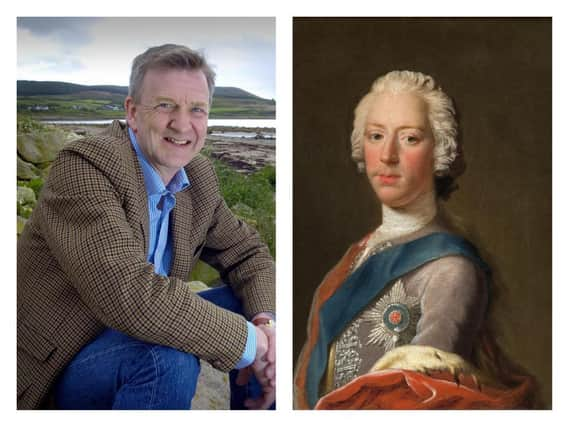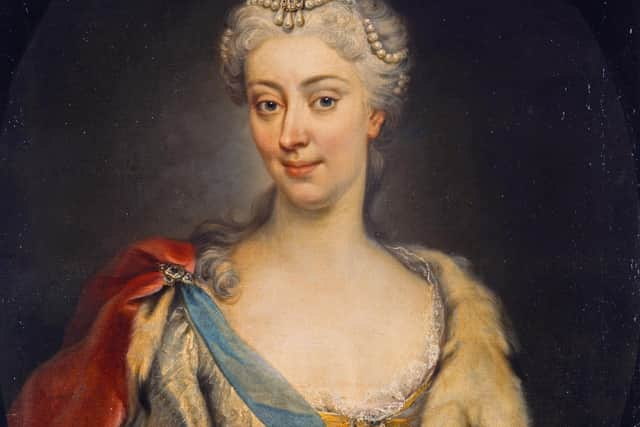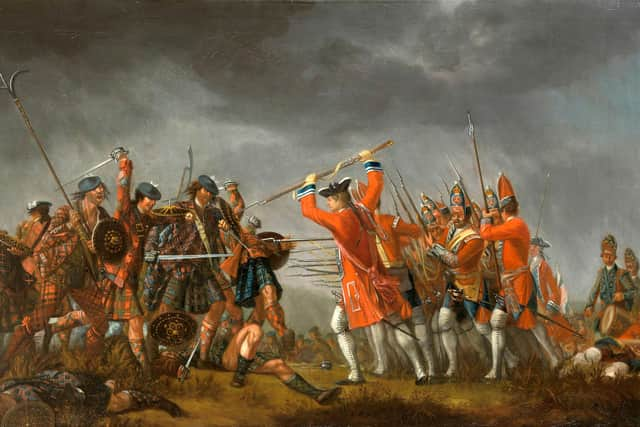Bonnie Prince Charlie: My flawed ancestor who 'tried his absolute hardest' for Scotland


Peter Pininski, the great-great-great-great-great-great grandson of the Prince has researched the life, characteristics and failures of the ‘Young Pretender’ for more than 20 years after learning of the direct family link with the man who led the failed 1745 Jacobite rising.
He is due to give a talk tomorrow on his findings as part of National Trust for Scotland’s commemoration of the 275th anniversary of the Battle of Culloden, fought on April 16 1746.
Advertisement
Hide AdAdvertisement
Hide AdMr Pininski will claim Charles’ personality partly mirrored that of his mother, Maria Clementina Sobieska, the granddaughter of King John III of Poland, who he described as a charismatic woman who died from anorexia aged 32.


The art historian and former investment banker , of Warsaw, who is from a family of Polish counts, said a series of letters by the Prince written in 1746 and 1747 documented his attempts to get help into Scotland following his failed rebellion.He said: “If people want to persuade me that in 1746 and 1747 Charles was not trying his absolute hardest to help Scotland by putting pressure on France and getting Spain to send supplies, well they are wrong."
Soon after his return to France, a request for 20,000 French soldiers was made to Louis XV with Spain agreeing to send food as the Prince declared he had “nothing more at heart than to help the Highlanders.”
In response to the perception that the Prince abandoned Scotland after Culloden while Jacobites were rounded up, imprisoned and executed, Mr Pininski said Charles departed to secure help from France.
He said: "If he didn’t get the French to come in and launch another invasion, there wasn’t any power in Europe that could help Scotland.


“Any hint that Charles did not care about what happened in Scotland after Culloden is absolute nonsense.”
He said Prince’s “raw talent” and self-belief had been enough for him to depart for Scotland – undeterred by a loss of men and arms on the way – and raise a Jacobite army despite his woeful lack of military experience.
But the Prince, who he described as “incredibly spoilt” in his younger years, ultimately didn’t have the depth of character to overcome the challenges posed by war or leadership.
Advertisement
Hide AdAdvertisement
Hide AdThe mood of the Prince in October 1746, a month after his return from Scotland is set out in a letter to his father, James VIII.
He wrote: “How can you imagine that I can enjoy any pleasure or amusement when I have continually before my eyes the cruelty with which my poor friends are treated?”
The following year, he wrote to Sir Thomas Geraldine: “It will be absolutely necessary to relieve the poor people of Scotland, who are in the greatest misery, as soon as possible.”
In this letter, he said the Court of Spain agreed to send three vessels of meal to the Highlands, with the Prince advising one large vessel would be better to call at either Barra, the Isle of Coll or the Uists.
But, the support did not materialise. In a letter to statesman Charles to Don Jose Carvajal, he complains no arrangement has been made to get “help for the poor Scottish Highlanders….these poor people who are still suffering the greatest misery and of whom a large number have already died.”
The Prince set out his intentions in a letter to Dr Archie Cameron of Lochiel, the last Jacobite to be executed for High Treason following the rebellion.
In 1747, the Prince wrote: "You are to make your way to the Highlands and as privately as possible you are to inform the people that HRH has nothing more at heart than to relieve their misery, that he has taken all the care in his power of them by the succour granted by the Court of Spain, and will constantly do the same, until he can compleat (sic) their happiness.”
By now, Highland culture was being systematically dismantled by the British state, often in brutal fashion.
Advertisement
Hide AdAdvertisement
Hide AdMr Pininski said: “When he came up against difficulties, he was unprepared. By the end of 1748, when he has tried to get the French moving and failed, he then falls into alcoholism.”
Mr Pininski said the Prince’s mother suffered from anorexia, with the illness intensifying following the breakdown of her marriage to James VIII.
She went to live in a convent with the couple later reunited, although the union was dogged by distance and unhappiness.
He said: “Clementina had a brittle character, it wasn’t elastic enough when things got difficult. Charles was also very charismatic but there was very little elasticity in his character. Anorexia and alcoholism are believed to have a genetic predisposition in some cases.”Charles embarked on “extremely passionate” affairs with two women, one his first cousin, while consuming copious amounts of Madeira as the failing of his rising bore down.
“He is letting off steam with these relationships. He drank because he had no resistance to things going wrong,” Mr Pininski added.
In 1748, a peace deal between the French and the British recognised the right of King George to the British throne, ending the French support for the Stuart cause and confirming the expulsion of the Prince.
Later, accounts from Rome described him as pimpled and ruddy through drink with a melancholic demeanour.
In 1768, he was alone and “keeping entirely private” with time spent exercising and playing the violoncello.
Advertisement
Hide AdAdvertisement
Hide AdThe apartment was hung with old red damask with two candles and two pistols placed on a table. One guest described how the Prince often picked up the weapons before examining them and setting them down. They had little purpose now.